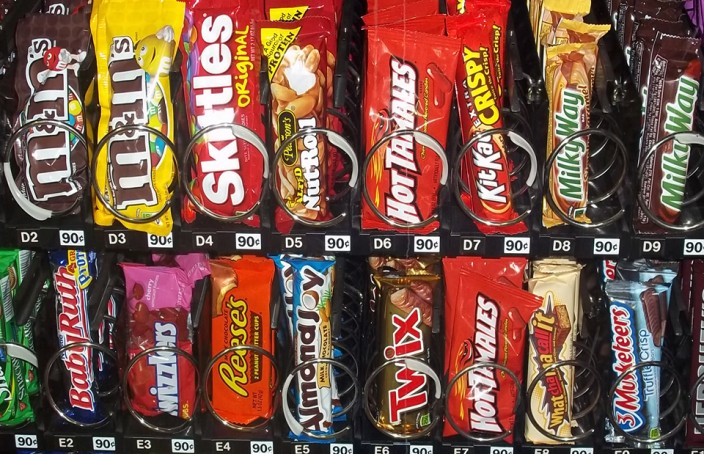HEALTHY VENDING: SENDING A CONSISTENT MESSAGE TO PATIENTS
Written By: Brent Reed, PharmD, BCPS-AQ Cardiology, FAHA, Assistant Professor in PPS
According to an article recently published in the Journal of the American Medical Association, one out of every three adults in the United States is obese, and obesity-related disorders such as cardiovascular disease and type 2 diabetes are at an all-time high. The U.S. Department of Health and Human Services has also observed similar trends in the rates of childhood and adolescent obesity, noting that one of the major contributors to this growing epidemic is a diet increasingly comprised of high-calorie foods and sugar-sweetened beverages.
Taking Steps Toward Prevention
Consuming a healthy diet is one of the cornerstones of disease prevention, and research suggests it works. According to one study published in the New England Journal of Medicine, eating a healthy diet can dramatically reduce the risk of heart attack and stroke when accompanied by other therapeutic lifestyle changes such as increased physical activity and smoking cessation. In another study published in Circulation, experts even suggested that if patients received all of the healthy lifestyle interventions for which they were eligible, the rates of heart attack would drop by nearly two-thirds.
Unfortunately, many of the institutions responsible for promoting healthy eating do not always provide individuals with this opportunity, as evidenced by the dearth of options available in vending machines at state-owned facilities. For example, after I counsel heart attack survivors on how to make healthy changes to their diet, they face a gauntlet of unhealthy options at every turn as they leave the hospital – even as far as the vending machines in the parking garage! Our schools of health education offer similarly limited options, making it difficult for students, faculty, and staff to choose foods and beverages that are consistent with the advice being provided to patients. Even our public parks and recreation centers have few healthy vending options. What good is jogging a couple of miles at the park when the only option for cooling down is soda?
Increasing Healthy Vending Options
Although the vending options provided in many of our state facilities run contrary to the goal of improving the health and well-being of Marylanders, there is a bill being introduced in the state legislature to change that. The Maryland Healthy Vending Machine Act (HB 1498 and SB 602) would require that all vending machines in state facilities provide healthy food and beverage options. Importantly, the bill does not force individuals to eat certain foods or beverages; it simply ensures they have a choice. Major components of the bill include the following provisions:
- At least 75 percent of the foods and beverages offered in vending machines must be healthy options, based on specific calorie, fat, sugar, and other content limits
- Food and beverage options with excess trans fat (0.5 grams per serving) and sodium (200 mg per package) must be removed
- Healthy food and beverage options must be displayed in a way that makes them easily visible and distinguishable from unhealthy options
- A clear statement regarding the nutritional content for each product must be displayed if not already visible on its packaging
If passed, Maryland would join more than 80 states and municipalities that have enacted similar legislation, according to information compiled by Sugar Free Kids Maryland. Other organizations that have signed on to support the bill include the American Heart Association (AHA), Med Chi, and the Maryland Association of Student Councils. Providing healthy vending options to the public also falls in line with recommendations made by the Institute of Medicine and Centers for Disease Control and Prevention.
Advocating for Change
Last month, I had the opportunity to visit the state legislature in Annapolis to lobby for the Maryland Healthy Vending Machine Act as a representative of the mid-Atlantic affiliate of AHA. Alongside cardiologists, medical students, nutritionists, and more, I shared some of the risks posed by unhealthy eating and the lack of access Marylanders currently have to healthy vending options in their schools, hospitals, parks, and workplaces. Since that time, I have continued to reach out to my legislators by email and phone to request their support for the bill.
So, what can you do to help? If you believe that Marylanders should have access to healthy food and beverage options in vending machines located in state-owned facilities, contact your legislators and let them know. Ask them to support our efforts to send a consistent message to patients across Maryland – that the hospitals, schools, and parks encouraging them to be healthy will also provide them an opportunity to do so!

